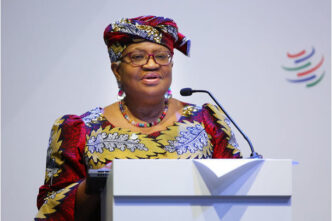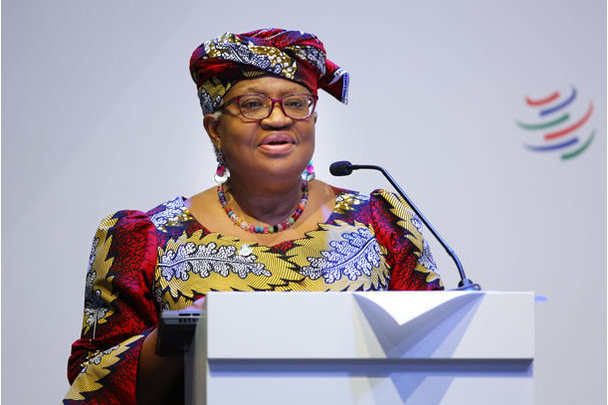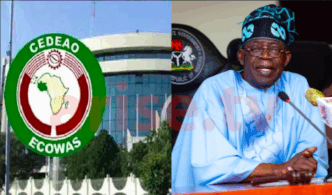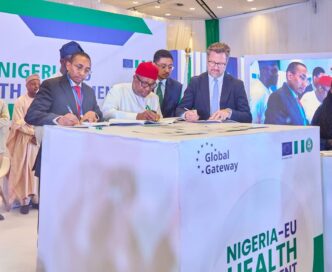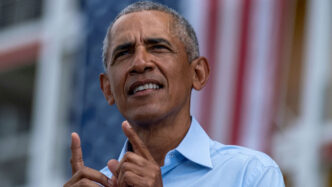The World Trade Organisation (WTO) has projected that Africa could emerge as the world’s fourth-largest economy by 2050 if it harnesses its demographic and resource potential.
WTO Director-General Ngozi Okonjo-Iweala, in an interview with CNN, said that trading within Africa remains considerably more expensive than with other regions, with intra-continental trade costs estimated to be about 20 per cent higher.
“It costs 20 per cent more for us to trade with each other on the continent than with others externally,” she said.
She linked the disparity to poor infrastructure, inefficient border management, and high transport and logistics costs.
Okonjo-Iweala said Africa’s economic prospects remain bright despite the challenges.
“The African continent has a lot of resources and a lot of things going for it. But there are also many challenges,” she said.
Meanwhile, the WTO data shows that only about 18 per cent of Africa’s exports stay within the continent, far below Asia’s 60 per cent and Europe’s 70 per cent, a gap the WTO chief described as unsustainable if Africa is to realise its economic ambitions.
Iweala’s analysis points to Africa’s trade inefficiencies to longstanding barriers such as fragmented customs systems, inconsistent tariff regimes, and limited industrial integration.
These challenges have particularly affected small and medium-sized businesses, which often find it cheaper to trade with Europe or Asia than neighbouring African markets.
The African Continental Free Trade Area (AfCFTA), launched in 2021 to create a single market of 54 countries, was designed to tackle these issues. Its full implementation, however, has been slow, with only a few countries ratifying the protocols on services and investment.
However the WTO maintains that if effectively executed, the AfCFTA could boost intra-African trade by over 50 per cent by 2030.
“Africa is an exciting continent, despite the challenges,” Okonjo-Iweala said.
She emphasised that sectors such as renewable energy, digital innovation, and manufacturing are showing promise, supported by a rapidly growing youthful population whose median age is just 19.
The African Development Bank projects that, with sustained growth and integration, the continent could become the fourth-largest economy by 2050.
Africa currently holds about 30 per cent of the world’s mineral reserves, including lithium, cobalt, and other critical materials essential for clean-energy technologies.
However, the WTO observed that limited processing capacity means most of these resources are exported as raw materials, with little local value addition.
“We need to move up the value chain,” Okonjo-Iweala said.
The WTO has also expressed concern about external pressures such as geopolitical conflicts and climate impacts that disrupt Africa’s supply chains.
The Russia-Ukraine conflict has increased food and fertiliser prices, while climate-induced droughts and floods have strained production and trade routes. Less than three per cent of global climate finance currently reaches the continent.
Efforts are underway to address these constraints. The WTO’s ongoing reforms aim to make global trade rules fairer for smaller economies, while new sustainability discussions seek to align trade practices with environmental goals without penalising developing nations.
At the regional level, African leaders reaffirmed their commitment to AfCFTA’s rollout during the African Union summit in Addis Ababa, targeting full operation by 2027.
Initiatives such as the Pan-African Payment and Settlement System are expected to lower transaction costs by up to half and reduce dependence on foreign currencies.
“Africa is not a monolith; each country has its strengths,” Okonjo-Iweala said.
She pointed to examples like Rwanda’s emerging technology sector and Morocco’s growing automotive industry. She expressed confidence that with coordinated policies and stronger infrastructure, Africa’s economic rise could redefine global trade dynamics.
“The challenges are real, but so is the opportunity,” she said.
She affirmed WTO’s support in Africa’s potential that it could double its GDP growth to around seven per cent annually and assume a central role in the world economy by mid-century.

